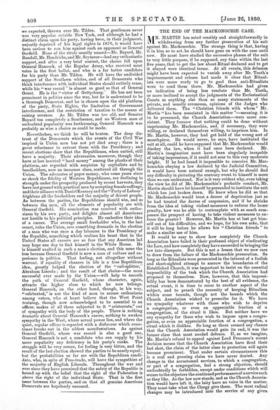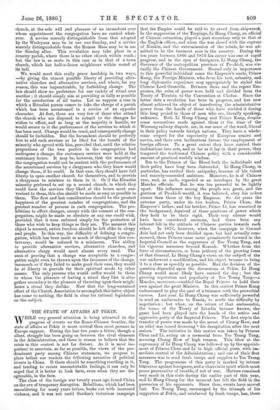THE END OF THE MACKONOCHIE CASE.
M R. MARTIN has acted sensibly and straightforwardly in al withdrawing from any further Prosecution of his suit against Mr. Mackonochie. The strange thing is that, having it in him so to act, he should have gone on with the case until now. He must have studied the successive phases of the snit to very little purpose, if he supposed, any time within the last five years, that to get the law about Ritual declared and to get it obeyed were identical terms. At all events, this delusion might have been expected to vanish away after Mr. Tooth's imprisonment and release had made it clear that Ritual- ists were more ready to go to gaol than anti-Ritualists were to send them there. Mr. Mackonochie had given no indication of being less resolute than Mr. Tooth, or more inclined to accept the judgments of the Ecclesiastical Courts as anything else than so many statements of the private, and usually erroneous, opinions of the Judges who delivered them. The " Christian friends with whom" Mr.
Martin "has. been associated in this matter "—meaning, it is to be presumed, the Church Association—were more con- sistent. They foresaw that nothing could be done without imprisoning Mr. Mackonochie, and, if necessary, they were willing, or declared themselves willing, to imprison him. In Mr. Martin, however, they had got hold of the wrong sort of mouthpiece. He would never, he says, have instituted the suit at all, could he have supposed that Mr. Mackonochie would disobey the law, when it had once been declared. Mr.• Martin's imagination must have been singularly incapable of taking impressions, if it could not soar to this very moderate height. If he had found it impossible to conceive Mr. Mac- konochie obeying a law declared by the Judicial Committee, it would have been natural enongh, but why he should find any difficulty in picturing the contrary event to himself is more than we can understand. Nor is it very evident why, even taking the view he did of Mr. Mackonochie's probable conduct, Mr.
Martin should have let himself be persuaded to institute the suit which has just broken down. He knew when he did so that Mr. Mackonochie would treat a decree of deprivation just as he had treated the decree of suspension, and if he shrinks from the idea of taking violent measures to enforce the lesser penalty, how was he able to contemplate with so much com- posure the prospect of having to take violent measures to en- force the greater? However, Mr. Martin has at last got him- self out of his difficulties, and we hope, for his own sake, that it will be long before he allows his " Christian friends " to make a similar use of him.
It would be easy to show how completely the Church Association have failed in their professed object of vindicating the Law, and how completely they have succeeded in bringing the law into disrepute. But this is not a lesson that we now care to draw from the failure of the Mackonochie prosecution. So long as the Ritualists were persecuted in the interest of a foolish and short-sighted attempt to narrow the boundaries of the Established Church, it was important to insist on the essential impossibility of the task which the Church Association had proposed to themselves. Now, however, that this impossi- bility has been demonstrated by the best of all evidence, the actual event, it is time to recur to another aspect of the subject, and to preach the necessity of keeping Ritualism within some bounds, though not the bounds which the Church Association wished to prescribe for it. We have no sympathy whatever with those who wish to deprive a congregation, or even an appreciable fraction of a congregation, of the ritual it likes. But neither have we any sympathy for those who wish to impose upon a congre- gation, or even an appreciable fraction of a congregation, a ritual which it dislikes. So long as there seemed any chance that the Church Association would gain its end, it was the former class that most needed defence. If, as we imagine, Mr. Martin's refusal to appeal against Lord Penzance's recent decision means that the Church Association have fired their last shot, the claim of the latter class to protection will again become prominent. That under certain circumstances this is a real and pressing claim we have never denied. Any change in the accustomed services, to which a congregation, or part of a congregation, feel a strong objection, should undoubtedly be forbidden, except under conditions which will secure to the objectors the continued performance of a service such as they like. As the law now stands, and as the Church Associa- tion would have left it, the laity have no voice in the matter. They must take what the Clergy give them. The most radical changes may be introduced into the service of any given
church, at the sole will and pleasure of an incumbent over whose appointment the congregation have no control what- ever. A service scarcely distinguishable from that adopted by the Wesleyans may be in use one Sunday, and a service scarcely distinguishable from the Roman Mass may be in use the Sunday after. This revolution may take place in a country parish, where there is no other church within reach ; but the law is as mute in this case as in that of a town church, which has half-a-dozen neighbours within sound of its bell.
We would meet this really grave hardship in two ways, —by giving the utmost possible liberty of providing alter- native churches and alternative services, and where, for any reason, this was impracticable, by forbidding change. The law should show no preference for one variety of ritual over another ; it should simply aim at providing as fully as possible for the satisfaction of all tastes. Let us suppose a case in which a Ritualist parson comes to take the charge of a parish which has been accustomed to a service of an opposite character. At first, there are very few of those who attend the church who are disposed to submit to the changes he wishes to effect, and as long as the majority is hostile, we would secure to it the performance of the services to which it has been used. Change would be cruel, and consequently change should be forbidden. But the Incumbent should be perfectly free to add such services as he liked for the benefit of the minority who agreed with him, provided that, until the relative proportions of the two parties in the congregation had undergone a change, the customary services were held at the customary hours. It may be, however, that the majority of the congregation would not be content with the performance of the accustomed services by a clergyman who they know would change them, if he could. In that case, they should have full liberty to open another church for themselves, and to provide a clergyman to minister to them in it. Cr if the Ritualist minority preferred to set up a second church, in which they could have the services they liked at the hours most con- venient to them, this also should be made as easy as possible to them. The first and last consideration should be the greatest happiness of the greatest number of congregations, and the greatest number of persons in each congregation. The pro- hibition to effect changes, except with the consent of the con- gregation, might be made as absolute as any one could wish, provided that it were enforced simply for the protection of those who wish to keep things as they are. The moment this object is secured, entire freedom should be left alike to clergy and people. In this way, the difficulty of defining a congre- gation, which has been made so much of throughout this con- troversy, would be reduced to a minimum. The ability to provide alternative services, alternative churches, and alternative clergy would meet almost every need. The onus of proving that a change was acceptable to a congre- gation might even be thrown upon the favourers of the change, inasmuch as if they failed to make good their case, they would be at liberty to provide for their spiritual needs by other
means. The only persons who would suffer would be those to whom the pleasure of having a ritual they like is alto- gether secondary to the pleasure of thrusting upon their neigh- bours a ritual they dislike. Now that the long-sustained effort of the Church Association to accomplish this latter object has come to nothing, the field is clear for rational legislation on the subject.



































 Previous page
Previous page